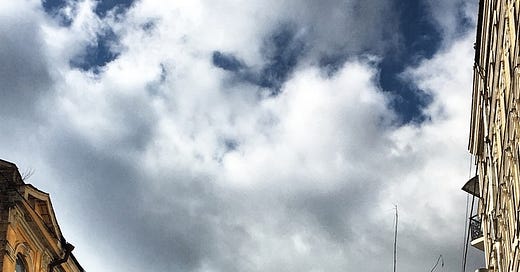on the Russian re-invasion of Ukraine
Since the last time I wrote, in mid-January, nearly all of my working hours have been consumed with monitoring Russian forces on Ukraine's border, and the gathering of the stormy clouds of disinformation the Kremlin has used to justify it.
My colleagues and I at the Centre for Information Resilience wrote about the continued information onslaught. We tracked, geolocated, and verified Russian military movements, uploaded in plain sight to TikTok and other social media by curious Russians, Belarusians, and Crimeans who wondered why there were columns of Russian tanks, radar, and other equipment rolling into their train stations and down their streets. I melted my brain watching hours of Russian language propaganda TikTok, training the algorithm to feed me the content it might feed a Putin supporter.* We showed that Russian claims of de-escalation were, diplomatically, a load of BS, and we watched nervously as provocations from the Russian side alleged a massive Ukrainian onslaught against Ukraine's own citizens in occupied Donbas.
Now, as I write this, Putin has officially recognized the so-called Donetsk and Luhansk People's Republics, where his proxies have operated for eight years. Russian tanks are cuurently rolling over Ukraine's sovereign borders under the guise of "peacekeeping" operations, and Ukraine is being re-invaded.
2014 had none of this certainty; when Russia illegally annexed the Crimean peninsula, it did so with "polite people" or "Little Green Men"—Russian soldiers without identifying insignia on their uniforms. Moscow sent mercenaries, "volunteers," equipment, money, weapons like the BUK missile that shot down passenger airliner MH17 to the Donbas, but for a long while did not recognize its involvement in the region.
Today, in a long, meandering speech, Putin denied Ukrainians' right to nationhood and the existence of the Ukrainian state. He claimed Ukraine has Russia to thank for its founding, that its political system is a sham, that it is a puppet of the West, with its government kowtowing to Western demands and NATO commanders calling the shots for the Ukrainian armed forces. Putin spun tall tales about the violence Ukraine was allegedly responsible for against Russian speakers, that Ukraine has made no democratic progress, that is a corrupt, economically unstable, farce. To me, many of Putin's descriptions sounded much more like modern day Russia than the Ukraine I have lived in and love.
To be sure, Ukraine is not yet a perfect democracy; in fact, there is no such thing. The quest for democracy has no end point; it's a journey towards—forgive me—a more perfect union. Yes, Ukraine still struggles with corruption. There are many ways it could stand to improve the funcitoning of its government, from the parliament to its ministries to the judiciary on down. But unlike in Russia, Ukrainian officials recognize this. Ukrainian activists hold them to account. Ukrainian people are skeptical and quick to criticize and protest. In short, all the ingredients for a robust democracy exist. They need more time to marinate, undeterred by the designs of authoritarians across the border or elected officials in Western countries who might use Ukraine as a political football. Ukraine has not yet been given a fighting chance in that regard.
And so, today, Ukraine is re-invaded. It is not Russian "peacekeepers" who are crossing the border, but fully kitted-out military forces. They are not "liberating" Ukrainians, whether those who have lived under occupation for the past eight years or any others they may encounter. They're removing Ukrainians' right to self-determination, not to mention their other unalieable rights that Americans and our allies claim we hold so dear. I hope to see the Euroatlantic community stand up for those rights, and soon.
*Interestingly, in addition to Russian propaganda, within a few days of watching this content it also started to feed me pro-Freedom Convoy videos...
Tomorrow (Tuesday, 22 February) at 11:30 ET: join me, the Centre for Information Resilience team along with journalists Christopher Miller and Jane Lytvynenko to unpack all of the above in a Twitter Spaces Discussion. Hope to see (hear?) you there.




